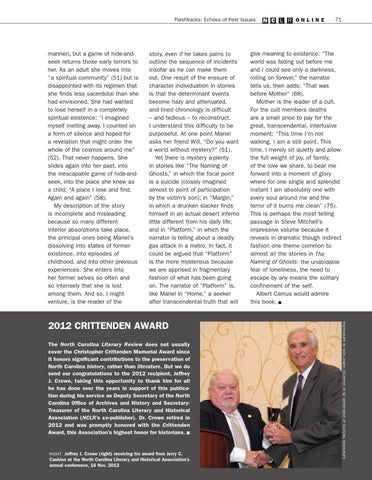Flashbacks: Echoes of Past Issues
manner), but a game of hide-andseek returns those early terrors to her. As an adult she moves into “a spiritual community” (51) but is disappointed with its regimen that she finds less sacerdotal than she had envisioned. She had wanted to lose herself in a completely spiritual existence: “I imagined myself melting away. I counted on a form of silence and hoped for a revelation that might order the whole of the cosmos around me” (52). That never happens. She slides again into her past, into the inescapable game of hide-andseek, into the place she knew as a child: “A place I lose and find. Again and again” (58). My description of the story is incomplete and misleading because so many different interior absorptions take place, the principal ones being Mariel’s dissolving into states of former existence, into episodes of childhood, and into other previous experiences. She enters into her former selves so often and so intensely that she is lost among them. And so, I might venture, is the reader of the
story, even if he takes pains to outline the sequence of incidents insofar as he can make them out. One result of the erasure of character individuation in stories is that the determinant events become hazy and attenuated, and lined chronology is difficult – and tedious – to reconstruct. I understand this difficulty to be purposeful. At one point Mariel asks her friend Will, “Do you want a world without mystery?” (51). Yet there is mystery a-plenty in stories like “The Naming of Ghosts,” in which the focal point is a suicide (closely imagined almost to point of participation by the victim’s son); in “Margin,” in which a drunken slacker finds himself in an actual desert inferno little different from his daily life; and in “Platform,” in which the narrator is telling about a deadly gas attack in a metro. In fact, it could be argued that “Platform” is the more mysterious because we are apprised in fragmentary fashion of what has been going on. The narrator of “Platform” is, like Mariel in “Home,” a seeker after transcendental truth that will
The North Carolina Literary Review does not usually cover the Christopher Crittenden Memorial Award since it honors significant contributions to the preservation of North Carolina history, rather than literature. But we do send our congratulations to the 2012 recipient, Jeffrey J. Crowe, taking this opportunity to thank him for all he has done over the years in support of this publication during his service as Deputy Secretary of the North Carolina Office of Archives and History and SecretaryTreasurer of the North Carolina Literary and Historical Association (NCLR’s co-publisher). Dr. Crowe retired in 2012 and was promptly honored with the Crittenden Award, this Association’s highest honor for historians. n
right Jeffrey J. Crowe (right) receiving his award from Jerry C.
Cashion at the North Carolina Literary and Historical Association’s annual conference, 16 Nov. 2012
71
give meaning to existence: “The world was fading out before me and I could see only a darkness, rolling on forever,” the narrator tells us, then adds: “That was before Mother” (68). Mother is the leader of a cult. For the cult members deaths are a small price to pay for the great, transcendental, interfusive moment: “This time I’m not walking. I am a still point. This time, I merely sit quietly and allow the full weight of joy, of family, of the love we share, to bear me forward into a moment of glory where for one single and splendid instant I am absolutely one with every soul around me and the terror of it burns me clean” (75). This is perhaps the most telling passage in Steve Mitchell’s impressive volume because it reveals in dramatic though indirect fashion one theme common to almost all the stories in The Naming of Ghosts: the unabidable fear of loneliness, the need to escape by any means the solitary confinement of the self. Albert Camus would admire this book. n
Photograph by Nick Lanier; courtesy of NC Department of Cultural Resources
2012 CRITTENDeN AWARD
N C L R ONLINE
